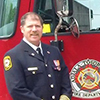Profile

Victor MacPherson, Is first responder in the fire industry for 30 years.
He has been involved in livestock emergency response program since 2013. Has become a lead instructor in these programs. Has helped in developing, emergency livestock response program for first responders, enabling them to communicate between the emergency services and the livestock industries.
Promoting safety awareness for first responders. Having a positive outcome thought best practice training. Through online or in person training sessions and publications.
Best Practices in Livestock Emergency Response – Ontario, Canada
Livestock being transported on Ontario Canada roadways (farm to slaughter and farm to farm) have caused numerous on-road incidents widespread (over a network of 16900 km roadways) in the province. The number of individual livestock traveling over Ontario highways annually include Cattle 480,000; Pork 480,000, Poultry 200,000,000; and the number of individual trips is over 500 livestock liner trucks on the road on a daily basis (these numbers don’t include farm to farm or small stock trailer trips.) Livestock Transport crashes and involvement often result in loose, injured, or dead livestock – while simultaneously dealing with human injury or death, or involving multiple vehicles. Distressed animals can be unpredictable and present a risk of injury to untrained responders – thus training is being provided to address the challenges of responding to these situations in a more organized manner. In the past – there was no organized training effort and responses varied by departments and personnel involved. Over 700 responders have been trained in the last 3 years (both online due to COVID and in person) by Farm & Food Care Ontario and various local organizations as a whole-sector farming coalition. Early results from incidents that occur show that trained responders are mitigating the various safety concerns faster than in the past, reducing the time on scene and improving welfare for animals trapped in these scenarios. Large animal rescue and livestock emergency response training provided as both hands-on and virtual is an effective forum to create positive change and consolidate training for responses to best practices for human safety and humane welfare of transported animals. Proper training and provision of related equipment reduces risks to first responders in livestock transport incidents
